
Blog

An alliance for clean air in Latin America is born
In the face of environmental injustices, like poor air quality and its harm to human health, our societies respond together and organize in similar ways, without even knowing it. This was one of the takeaways from the Latin American Meeting for Clean Air, which in early August brought together researchers, government officials, youth leaders, civil society representatives and international cooperation agencies from Brazil, Chile, Colombia, Ecuador, Mexico and Peru. They met with three main objectives: to strengthen the link between air quality and climate justice, to exchange lessons learned, and to build networks for international collaboration. "Poor air quality and related health problems are a common problem in Latin America, knowing no borders or territorial boundaries," explained Anaid Velasco, Research Manager at the Mexican Center for Environmental Law (CEMDA). According to the World Health Organization, air pollution affects close to 90 percent of people living in urban areas around the world. Despite the magnitude of the problem, public actions and policies to improve the air we breathe are not fully standardized. In addition, air quality indices across the region are not uniform and do not allow people to be adequately informed of the dangers of air pollution in different environments. This represents a problem and, at the same time, an opportunity to collaboratively create and refine tools. Aware of the opportunity, meeting participants founded the Latin American Coalition for Clean Air (ALAIRE) to respond to three primary goals: To position a narrative that makes air quality a strategic priority in the public health and climate crisis management agendas in Latin America. To influence authorities and promote public policies that contribute to an improved management of the sources that contribute to poor air quality in the region. To advocate for conditions for civil society and the business sector to become involved in compliance with regulations, policies and the improvement of air quality in the continent. "The creation of this coalition is a fundamental step towards improving the air we breathe, across the region," Velasco said. "CEMDA is very proud to be part of it as clean air is a fundamental condition to guaranteeing the human right to a healthy environment." The Latin American Meeting for Clean Air was organized by AIDA, El Derecho a No Obedecer (a project of Corporación Otraparte), Trébola Organización Ecológica, Coalición Respirar, El Poder del Consumidor and the Heinrich Böll Foundation. It had open activities attended by 200 people, as well as closed meetings to reach agreements among the key organizations. The meeting served to reaffirm that the fight for clean air is also the fight to reduce greenhouse gases and confront the climate crisis, as well as a necessity to guarantee the right to health of people in the region. The event also confirmed the importance of citizen science, in which individuals are working to demonstrate the true levels of exposure to poor air quality in different cities in the region, in turn highlighting the urgency to act. The newly formed coalition will empower the efforts of citizens, academics, organizations and other actors, while contributing to the achievement of regional agreements for the development and implementation of public policies that improve air quality and protect human health.
Read more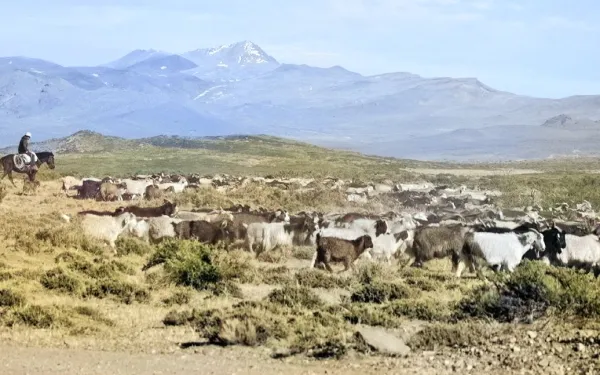
The Mapuche: in defense of ancestral territory in Argentina
In the south of the province of Mendoza, Argentina, several communities belonging to the Mapuche people—one of the 39 self-recognized indigenous peoples throughout the country—have come together in the Malalweche Territorial Identity Organization to defend their rights, way of life and territorial integrity from extractive, energy and tourism activities and projects. One of the threats that these communities are currently facing is the advance of the exploration and exploitation of unconventional hydrocarbons through fracking. In 2018, the government of Mendoza issued Decree 248, which regulates fracking activities in the province. Before issuing the norm, it overlooked the right of the Mapuche communities in the area to be consulted and to give their free, prior and informed consent. It then made the consultation conditional on the communities having legal recognition of rights over their territory. Since then, the Malalweche Territorial Identity Organization has been fighting a court battle to have the decree declared unconstitutional. The lawsuit, initiated by the Oikos Environmental Network Association, is backed by national and international environmental organizations, including the Association for the Promotion and Protection of Human Rights-Xumek, the Environment and Natural Resources Foundation (FARN), AIDA and Earthjustice. The Mapuche communities are tireless in their struggle. The reason is simple: their strength comes from what they protect. It comes from their intimate connection to the territory and all that it holds. A broader vision of territory As in the case with indigenous peoples across the American continent, territories of the Mapuche people are rich in natural resources, which causes large interests to set their eyes on them, ignoring or wanting to ignore those who legitimately inhabit them. For the indigenous communities, territory is not limited to geographical space, but is conceived as the wider space from which human activities, such as grazing paths, emerge and converge. Rivers, mountains and animals are essential elements of the ancestral territory of the Mapuche people. They are distinctive parts of their culture. "These elements also make up the transhumance—a type of pastoralism that consists of seasonal movement along migratory routes—of the people who move, who go from one place to another," explains Gabriel Jofré, a traditional authority and spokesperson for Malalweche. "Today the territory is limited by private property, which makes you settle in a place; our parents used to say that you go where the territory takes you.” The intrusion and territorial usurpation by dominant and oppressive elites —at the beginning of the 20th century—led to the exodus of members of the Mapuche people, the dispersion of others and the silence of many more for fear of repression. In defense of community life Faced with the environmental, social and economic impacts of the intrusion of business activities in the ancestral territory of the Mapuche, the organization Malalweche promotes access to indigenous community property. Although the Argentine State recognizes in its Constitution the ethnic and cultural pre-existence of indigenous peoples and has ratified international conventions that oblige it to respect and guarantee their rights, the legal recognition of the rights of Mapuche communities to indigenous territories faces administrative obstacles and delays due to bureaucratic processes. "That is why, to avoid legal obstacles, we have developed the strategy of creating productive cooperatives," explained Gabriel. Kume Matru food products factory, a cooperative enterprise, was inaugurated on June 23, the date on which Winoj Tripantu, or the beginning of the Mapuche year, is celebrated. Kume Matru is a clear example of the versatility of these communities to walk the path of sharing and bringing together their own needs and those of others; to deliver not only food, but also the whole chain of hands that made it possible. "The people who recover these processes are a reflection of the ancestral forces that are in the territory of the pullü, the spirit of our grandparents," said Gabriel. "It is our children who begin to recover what at some point was cut off, these are processes that must be protected in order for that to happen." In line with this need, last March, the Inter-American Commission on Human Rights established that, in a context of climate crisis and environmental deterioration, "the States have the duty to title, delimit and demarcate the collective ancestral territory, attending to the particular characteristics of the specific human group and avoiding granting concessions for projects that may affect the territories in titling, delimitation and demarcation processes without a process of consultation and consent". The norms are clear, both domestic and international. States must guarantee the rights of indigenous peoples, avoiding governmental acts and/or judicial rulings that could affect them, and ensuring that economic development is sustainable and respectful of environmental integrity. Let us recover the legacy of the original peoples, who teach us to live in harmony with nature, as parts of the whole, interconnected with their forces, from which our own must also emerge as a renewed impulse to defend our common home.
Read more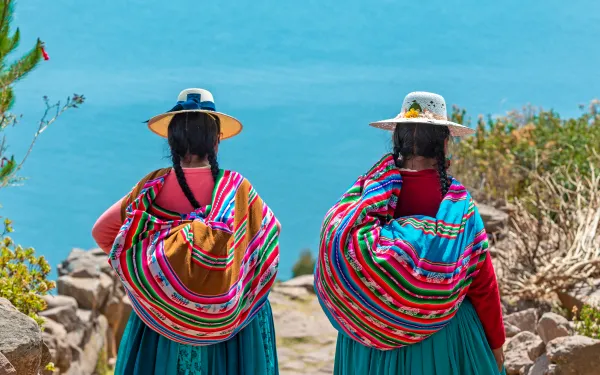
Lessons on protecting the right to a healthy environment
A healthy environment implies, among other things, breathing clean air, having access to clean water and quality food, and having a decent place to live. Until recently, the human right to a healthy environment was recognized only at the national level in most countries of the continent. Then, on July 28th, in a historic resolution, the United Nations voted unanimously to recognize a clean, healthy and sustainable environment as a universal human right. The decision is a significant step in the long and complex process of guaranteeing the right to a healthy environment in practice, which has been part of AIDA's story since our inception. "For nearly 25 years, we have invoked the right to a healthy environment to defend people in Latin America from environmental impacts that threaten their lives and dignity," explained Gladys Martínez de Lemos, our executive director. AIDA has always worked to highlight the link between a healthy environment and fundamental human rights such as those to integrity, life, and health. "In international law, it has taken time to assume this relationship, which for the AIDA has been undeniable from the start," added Liliana Ávila, senior attorney. "Our approach to international law begins with those affected and, based on that proximity, focuses on the communities whose rights have been most impacted by environmental degradation." What we’ve learned As an essential part of our efforts and over the years, we have learned that: The right to a healthy environment is increasingly included in Constitutions, laws and regional justice systems. This has empowered individuals and communities to demand its defense, as well as motivated judges to integrate it into their decisions. Strategic litigation—a combination of legal, communications, social mobilization and advocacy tools—is especially important in promoting the protection of fundamental human rights. The climate crisis has exacerbated the impacts of environmental degradation on the enjoyment of human rights and cases have tripled in number. This has brought with it the need to rely more on comprehensive and less on case-by-case strategies. Despite important advances, there are still large compliance debts for the right to a healthy environment to materialize in practice. The main challenge is the lack of implementation of court rulings. At the same time, the link between a healthy environment and human rights has served a variety of purposes, including the following: Demonstrating that the right to a healthy environment and other rights essential to life are indivisible. Demanding that States comply with their international human rights obligations, especially the application of the principles of prevention and precaution. Promoting the guarantee of access rights in environmental matters such as the right to information and participation. Our most emblematic cases While defending the right to a healthy environment is present in all our work, there are emblematic cases in which AIDA has helped establish key precedents by guaranteeing it. Restoration of rights for residents of La Oroya, Peru Our work as an international environmental organization began in 1998 with this case. Since then, we’ve worked to demonstrate how the violation of the right to a healthy environment—due to air pollution with heavy metals from a smelter—has violated the rights to life and health of residents of the city of La Oroya, Peru. We’ve shown how the impacts have been differentiated for women, children and the elderly. And we’ve demanded that the Peruvian State take urgent measures to guarantee the rights of the affected population. In 2005, we took the case to the Inter-American Commission on Human Rights, which in September 2021 brought it before the Inter-American Court after establishing the international responsibility of the State. It will be one of the first cases to centrally address the indivisible relationship between a healthy environment and other human rights. A healthy environment as a fundamental right for human existence In November 2017, in response to a consultation made by Colombia, the Inter-American Court of Human Rights established that a healthy environment is an autonomous right, "fundamental to the existence of humanity." It also recognized the impact of climate change on the effective enjoyment of human rights, especially for the most vulnerable populations such as indigenous peoples, children and people living in extreme poverty. In the framework of the consultation, AIDA presented our observations and participated in the hearing before the Court. We demonstrated that the implementation of large infrastructure projects could affect the environment to such an extent that it would put life and personal integrity, among other human rights, at risk. Our contribution made clear the link between human rights and the environment. Access to justice for people affected by environmental damage When Veracruz residents defended the Veracruz Reef in court against damage from a port expansion, AIDA presented technical and legal evidence supporting recognition of the rights to a healthy environment and access to justice. Together, these obligate the government to allow anyone whose fundamental rights are threatened by environmental degradation the possibility of achieving justice, regardless of whether their connection to the threatened ecosystem is indirect or remote. We directly contributed to the Mexican Supreme Court’s ruling in February 2022, in which the Court determined that authorities violated the right to a healthy environment of the people of Veracruz by authorizing the port project. "The UN's recognition of the right to a healthy environment as a universal human right is undoubtedly an impetus for the construction of new key precedents for its protection," said Daniela García, AIDA attorney. It’s also an impetus for states to strengthen their policies and legislation focused on environmental protection, as well as to enshrine this right in their legal frameworks. And it’s a tool for people and organizations that defend the environment and human rights to strengthen their work. At AIDA, we are clear about this, and we reaffirm our commitment to our mission of strengthening people's capacity to guarantee their individual and collective right to a healthy environment.
Read more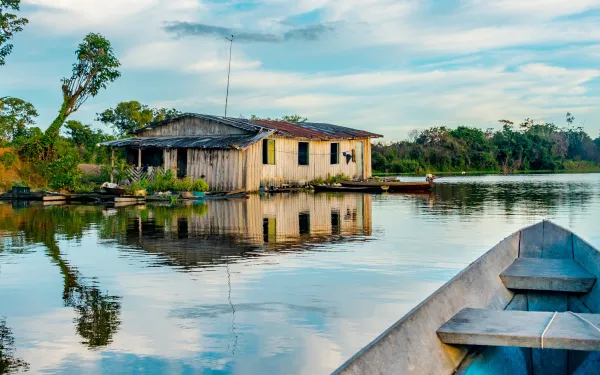
Brazilian court reaffirms the power of litigation to strengthen climate action
In July, Brazil's high court ruled that the government has a constitutional duty to allocate the necessary economic resources to support the operation of its Climate Fund, a tool created to combat the climate crisis, which has been paralyzed in recent years. With this ruling, the Supreme Federal Court resolved the first climate litigation in its history and set an important precedent for Brazil and the world. The decision equates the Paris Agreement—which seeks to strengthen the global response to the climate emergency—with a human rights treaty, granting it a higher status than ordinary laws and other inferior norms such as Executive Branch decrees. This may give way for courts and judges in other Latin American countries to make the same recognition. "The Supreme Federal Court created a privileged framework of protection for climate change mitigation and adaptation, one that ensures one of the fundamental pillars of climate action: financing," explains Marcella Ribeiro, an AIDA attorney. "Furthermore, it made clear that the Executive Branch, by restricting resources that by law are destined for climate action, is failing to comply with international agreements and conventions on human rights to which Brazil is a party." The Brazilian Socialist Party, the Socialism and Liberty Party, the Workers’ Party and the Sustainability Network Party filed the lawsuit over the Brazilian government’s failure to provide resources to the Climate Fund in 2020, with support from the Climate Observatory and the Alana Institute. Litigation as a strategic tool The case of the Climate Fund in Brazil demonstrates that strategic climate litigation is an effective and necessary way to help the continent's governments and companies meet their climate commitments. In its most recent report, the Intergovernmental Panel on Climate Change (IPCC) highlighted that climate-related litigation is on the rise and, in some cases, has influenced the results and ambition of climate governance, understood as the way in which different actors—state, civil society, academia and the private sector—define, implement and monitor actions aimed at addressing the causes and consequences of climate change. "In the global south, Brazil is one of the countries where climate litigation is developing most strongly," highlights Javier Dávalos, AIDA senior attorney. "The country is characterized by a growing ecosystem of litigants and organizations that are taking the climate fight to court." Brazil's push for climate litigation in the region is critical because the country is home to 65 percent of the Amazon, a key ecosystem for global climate regulation and one that is at serious risk. Brazil emits the most carbon dioxide of any Latin American nation, with deforestation representing the largest source of these emissions. In this sense, it is fundamental that one of the judges who heard the Climate Fund case explicitly pointed out the large increase in deforestation in the Amazon in 2021— the highest in 15 years: more than 22 percent, and a total area of 13,235km². It is therefore essential to demand in court that the Brazilian state fulfill its obligations to protect the Amazon and the global climate. The importance of financing solutions Transitioning to a zero carbon economy and avoiding the worst physical impacts of climate change requires investing nearly $125 billion USD by 2050, according to the Net Zero Financing Roadmaps study commissioned by the United Nations High Level Champions. These resources must come from two complementary sources, private and public financing. Government financing of climate action represents a relevant public policy and thus must conform to a country's laws. In its ruling, the Brazilian Supreme Federal Court recognized the Climate Fund as the main federal instrument for financing climate action and meeting national greenhouse gas emission reduction targets. It also noted that the government kept the fund paralyzed for two years. Considering that the resources intended to fight the climate crisis seek to materialize fundamental human rights, the court concluded that the government couldn’t restrict them. "Guaranteeing the allocation of resources for climate action means setting a clear limit from which we cannot retreat," Ribeiro said. "Despite the clear violation of the Brazilian state's duties regarding the right to a healthy environment, reflected in the dismantling of environmental norms and institutions, the Brazilian Supreme Court's ruling put a brake on the erosion of the legal protection of the environment and climate in the country." Learn about this and other cases on AIDA’s Plataforma de Litigio Climático para América Latina y el Caribe.
Read more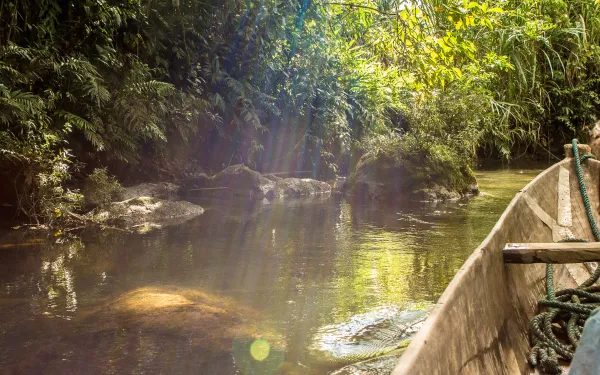
Examining the obstacles to energy transition in Latin America
The climate crisis and its impacts on human rights require the governments of Latin America to design and implement laws, public policies, and other measures aimed at protecting the lives and integrity of their people. In the region most threatened by global warming, they must do so through mitigation, adaptation and attention to the losses and damages already caused. Given that the current energy system based on fossil fuels is the main cause of the climate crisis, as well as the inequalities that are closely linked to it, the framework for climate action in the Americas must be that of a just energy transition. The energy transition is an opportunity for the continent to abandon old energy production models characterized by large social and environmental impacts, and to move towards environmentally and climatically sustainable methods, while respecting the human rights of the communities and sectors involved. Several countries in the region are failing to integrate this perspective. The case of Colombia exemplifies a risky trend for the region—the government is currently promoting a host of climate-aggravating projects, which deepen dependence on fossil fuels, as useful to the energy transition. Such regressive measures include: the expansion of coalmines in operation or the opening of new mines under the argument that the export of the mineral will finance the transition; and the favoring of natural gas exploitation through tax benefits and the easing of environmental permitting processes, under the false premise that gas is a clean energy source. Sounding the alarm Given the worrying panorama in Colombia, AIDA will be drafting and distributing a series of Urgent Alerts that call attention to projects, public policies and regulations that hinder a just transition, and deepen dependence on fossil fuels. They will be collective alerts, supported by other international organizations that, like AIDA, seek climate justice and work in defense of environmental and human rights. Each alert will be sent to the national authorities in charge of the measure in question. Geared toward promoting reflections on how to advance in the just energy transition, each alert will include public policy and regulatory recommendations based on the State's international obligations and commitments on climate, environmental and human rights issues. In each case, the message is clear—by continuing with the promotion, extraction and use of gas and coal, the Colombian State would be failing to comply with these obligations. The first alert calls attention to the potential definitive diversion of the Bruno stream in the department of La Guajira to expand production at and revenue from El Cerrejón, the largest open-pit coal mine in Latin America and one of the ten largest in the world. The project not only implies an increase in greenhouse gas emissions—coal is responsible for 44 percent of global carbon dioxide emissions—but is also a threat to the rights to water, food security and health of the Wayuu indigenous communities that depend on the stream. A regional scope The measures adopted by the Colombian State may well reflect the situation in other countries of the region, or be replicated in them. Several alerts will refer to the exploitation of hydrocarbons through fracking, a controversial technique advancing blindly in Colombia and other Latin American countries. Another will warn of the use of hydrogen, promoted as a viable and clean energy alternative. In Colombia there is already a public policy route to advance with its implementation and two pilot projects underway. Hydrogen production results from burning coal or gas at high temperatures. Recent studies warn that this requires capturing and storing carbon dioxide, so the alternative depends on being able to store carbon indefinitely and avoid leakage into the atmosphere. In addition, hydrogen production is energy-intensive and involves the emission of gases during the heating and pressurization process, as well as the use of natural gas as fuel. As a region, we cannot afford to delay the energy transition and the achievement of climate justice, both urgent and necessary goals, with options that will only tie us more and more to fossil fuels and to an energy system that only intensifies social inequalities and environmental degradation.
Read more
What is a just energy transition?
It is possible to propose real solutions to current problems. The various crises facing humanity—climate, energy, food, environment, health—as well as the enormous inequalities that cause, and are deepened by, them can be overcome if we manage to rethink the systems in which we live. In 2021, the energy sector contributed 73.2 percent of total global greenhouse gas emissions. The current energy system, based on fossil fuels, is unequal and inequitable. It is concentrated in large private or state-owned companies, is particularly conflictive in terms of access to resources, and is closed to social participation in decision-making. For these reasons, progress on the energy transition is urgent. There is no single view of energy transition; it is a concept in dispute. Toward what? For whom? How? Conservative views focus the transition on a process of technological substitution toward a change in the energy matrix focused on renewable resources and the search for energy efficiency. On the other hand, the most complete proposals warn that a change in the energy matrix is necessary, but not enough. They see the transition as a process of integral transformation, territorially situated and plural, which implies the creation of new socio-political conditions that restructure the organization, ownership and distribution of the current production and consumption systems. The goal is advancing the right to energy. If we consider the transition as a systems change, it is essential to build another type of relationship between human beings, nature and means of production. Guidelines for thinking about the energy transition in Latin America Based on the arguments of Pablo Bertinat, an expert on the subject, to walk this path in the region requires that we: Build the right to energy as a collective right, in congruence with the rights of nature. We must: take into account the damages to territories and communities created by energy development; eradicate Sacrifice Zones by recognizing their vulnerability; and guarantee respect for human rights during the transition. Solve energy poverty problems with clean, accessible, reliable and affordable energy. Energy projects must benefit the territory in which they are installed in terms of creation, supply and work force, in order to achieve the redistribution of wealth. Advance a process of energy reduction in the face of a scenario of restriction in which resources do not cover the demand. This implies an integral transition. A new productive model based on the availability of energy must be considered, as well as rethinking transportation systems, agriculture, infrastructure, etc. Deepen the change of the energy matrix from processes of resignification of technologies to those that are adequate, that is to say, that allow social inclusion, that are built from the communities, that are oriented to solve their problems, and that take into account the processes of acceptance of new energy enterprises. Promote energy democratization processes through the participation of diverse actors, particularly excluded sectors, in decision-making regarding the transition and the creation and implementation of policies, guaranteeing the rights of access to timely and complete information, quality participation and access to environmental justice, in order to ensure energy autonomy at the local level. In conclusion, speaking of a just energy transition implies recovering energy as a tool to satisfy human needs in a context of finite resources and inequalities. We must not start from scratch. Local communities, academic institutions, non-governmental organizations, social organizations and governments have already taken important steps towards a just, democratic and popular energy transition in the region. With this momentum, the transition is not only desirable, but possible.
Read more
5 reasons to end coal extraction and use
The use of coal to generate energy began two thousand years ago. Today, its role as a fuel must come to an end: the negative impacts of its exploitation and use far outweigh the benefits. The solution to the climate crisis lies, in large part, in ending dependence on coal. Across the region, we’re seeing a growth in coal projects that conflicts with global emissions reduction targets. In a post-pandemic context, nations must commit to an economic recovery that keeps coal in the ground. As governments and companies across Latin America continue to promote the industry and ignore the true costs of coal, we’re offering them five reasons why the mining and burning of coal is a bad decision – economically, politically, environmentally, for human rights and the climate. 1. Coal is economically unviable due to the high costs of its impacts. The current production chain fails to consider the external costs derived from coal’s climate and environmental impacts, and social damages and it causes, which could double or even triple the price of electricity generated. For example, exporting a ton of coal from Colombia to Europe, the United States or Asia entails estimated external costs between $144.64 and $210.95 per ton, three times the market price of coal (which was $47.80 per ton in August 2019) (1). The exploitation and use of coal becomes economically unviable because the market price is not enough to cover the repair of the damage caused. The most serious aspect is that since the companies in the industry do not assume these costs, they are left in the hands of States, communities and ecosystems. 2. Coal projects create unemployment Arguments that coal mining stimulates development wherever it is carried out are a myth. The pollution created by coal mining impacts the health of the people exposed to it, affecting their work effectiveness and putting them at a disadvantage in accessing other work options. This results in up an unemployment rate of up to 40 percent in populations located near coalmines. In addition, the non-conventional renewable energy industry currently employs many more people than the coal industry. According to the International Renewable Energy Agency, that industry generated 11 million jobs worldwide in 2018, while the 10 countries with the most coal-dependent labor sources only generate approximately 225 thousand jobs. According to UN estimates, switching to renewable energies could generate up to 35 million additional jobs between 2020 and 2050. 3. Investing in coal is increasingly risky Both banks and insurance companies are ceasing to invest in the coal sector because of its high costs, high risks and low profitability. Today, 26 of the world's 35 largest banks have policies restricting financing for projects related to coal mining or coal-fired power generation. In fact, a group of OECD countries recently announced that they will end financial support for coal-fired power plants. Similarly, at least 18 of the world's largest insurance companies have decided to restrict activities linked to the coal industry. This shows that, thanks to public pressure, the industry is being de-financed and its market is no longer insurable. 4. Coal use aggravates the global climate crisis The extraction and burning of coal aggravates the climate crisis and causes vast human rights impacts: among them floods that displace residents, fires that destroy villages and ecosystems, and droughts that destroy crops. According to the Intergovernmental Panel on Climate Change, coal is responsible for 44 percent of carbon dioxide (C02) emissions from fossil fuels. Just nine countries are responsible for 85 percent of global emissions from its combustion. Coal mining also emits methane, a gas with 67 times more power than CO2 to warm the planet over a 20-year period and whose emissions are responsible for about 25 percent of global warming. Building new coal-fired power plants implies catastrophic climate change. This is why the UN proposed urgently accelerating the decarbonization of all aspects of the economy. To stay on track toward limited warming just 1.5°C by 2050, 90 percent of coal must remain in the ground. 5. Coal mining and use violate essential human rights, such as health. The entire cycle of coal—from its extraction, transport and export, to its burning or combustion—causes irreversible damage to people. One of the main impacts of coal mining is the degradation of air quality, which in turn violates the rights to health, life and a healthy environment, generating high rates of morbidity and mortality. The damages caused by coal mining include pneumoconiosis (black lung), known as "the miner's disease", which considerably reduces the life expectancy of those who work in mines and the surrounding communities, where children are the most affected. Likewise, pollutant emissions from coal-fired power plants are mainly responsible for the formation of microscopic particles (PM10 and PM2.5) capable of penetrating the respiratory and blood systems, increasing the rates of serious diseases such as lung cancer, and causing premature deaths. These five reasons are at the same time arguments for the decarbonization of Latin America's energy matrix. The region can and should direct its efforts towards a matrix based on non-conventional renewable energies that are environmentally friendly, people-friendly and sustainable over time. For more information, see our report Carbón, un combustible condenado al entierro. El final de una era y la promesa de una transición justa. (1) Precios actualizados a 2019 tomados de Cardoso A. Behind the life cycle of coal: Socio-environmental liabilities of coalmining in Cesar, Colombia. Ecological Economics 120 (2015) 71- 82, y Cardoso A., Santamaria R,. Peñalver L. (2019). Thetrue cost of coal in Colombia.
Read more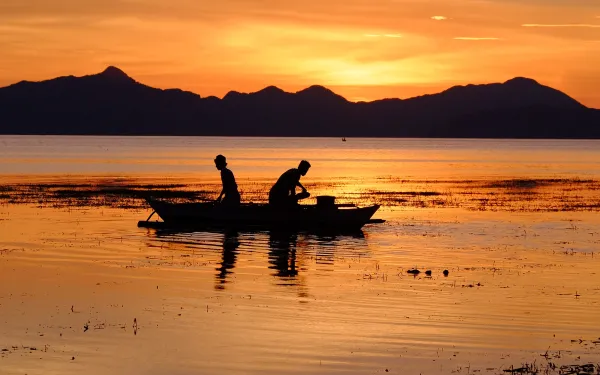
Latin American fisheries are at risk
By Magie Rodríguez (AIDA) and Ernesto Fernández Monge (The Pew Charitable Trusts) Fishing is fundamental to the Latin American economy and, for of our region’s people, their way of life. It’s a centuries-old industry at risk. According to the Food and Agriculture Organization of the United Nations, the region produces 21.5 million metric tons of fish each year, a quarter of the world's annual production. Roughly 2.3 million people are involved in fishing activities. However, the industry is losing out to aggressive foreign fleets, mostly from Europe and Asia, fishing within Latin America's exclusive economic zones (EEZs) and in areas just outside them. Unlike domestic vessels, these fleets often benefit from substantial funding from their home governments, which allows them to fish outside their own countries' waters. These fishing subsidies, intended to increase capacity, are harmful. They pay for fuel and other expenses, artificially reduce the cost of fishing, and allow fleets to fish in areas where it would otherwise be unprofitable to do so. After more than two decades of talks, the 164 member governments of the World Trade Organization (WTO) are closer than ever to agreeing on a new globally binding treaty that would curb harmful subsidies that allow fleets to fish both in other countries' waters and on the high seas. Fishing offshore, on the periphery of another nation's waters, can harm a country's fisheries in part because it allows foreign vessels to catch migratory species, such as tuna or billfish, before they enter the EEZ. As trade ministers prepare to meet in Geneva for a WTO ministerial conference June 12-15, Latin American leaders must push for a fisheries subsidies agreement that will help their countries' fishermen better compete with foreign fleets. To do so, the agreement should eliminate all capacity-enhancing subsidies that prop up so-called distant-water fishing and allow more fishing than the market would otherwise sustain. Each year, governments around the world dole out $22 billion in harmful subsidies to fisheries and, of that amount, nearly two-thirds comes from just six countries and the European Union. About one-third of that amount, $7.2 billion, is targeted to help countries fish in other nations' EEZs and offshore at the edge of those territorial waters, according to a new research-based tool developed by scientists at the University of California, Santa Barbara, with funding from The Pew Charitable Trusts. The increase in distant-water fishing is driven by a sad reality: having depleted fish stocks in their own waters, major fishing nations are looking elsewhere to fill their nets. Ecuador's Galapagos Islands made headlines last year when research revealed that in just one month, 300 Chinese vessels spent 73 thousand hours fishing off the EEZ surrounding the Galapagos. In addition, the tool shows that, for example, 180 vessels from just four countries (China, South Korea, Chinese Taipei and Spain) spent a total of 84 thousand hours fishing in Argentina's EEZ in 2018. That's the equivalent of 9.6 years on the water. That undertaking was made possible by nearly $92 million in harmful subsidies. Encouragingly, leaders across the region have long supported reducing subsidies in distant waters: Argentina, Chile and Uruguay co-sponsored a WTO proposal in 2019 to ban such subsidies and, in July 2021, Uruguay's foreign minister stated that such a ban would have "enormous potential to have a significant impact on the state of the oceans and the livelihoods of fishing communities." However, major fishing nations are seeking to water down the text of the potential WTO agreement so that they can continue fishing in other countries' waters. That’s why Latin American trade ministers must continue to push for the elimination of subsidies in distant waters, helping to ensure that fish from their waters primarily reach their vessels, restore competitive advantage to the region's fishermen, and sustain a vital industry—and livelihood—across the continent.
Read more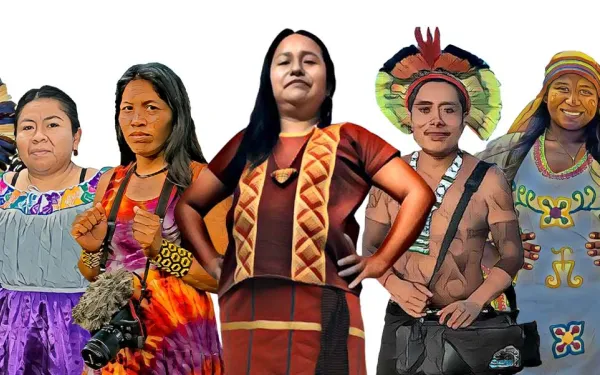
The indigenous resistance, told in their own voice
It’s vital that indigenous and traditional communities have the opportunity to use and strengthen their voices not only to denounce the systematic violation of their rights, but also to share the ancestral knowledge that is key to addressing the current environmental and climate crises. For a variety of reasons, organizations that accompany indigenous struggles, as well as the media and journalists who portray them, often speak on behalf of these peoples. While this intermediary work can help increase the visibility and impact of the frontline defense of territories, there is no better way to hear and understand their stories than from the people who live them. The Intercultural Encounter of Indigenous Communicators represents a step forward in this sense, as it amplifies the work of six indigenous defenders who have made communication a valuable tool for protecting their territories. The project brings together members of indigenous communications collectives from across Mexico, Central and South America to share their experiences defending land, culture and ancestral ways of life. Their stories are of strength and self-determination. Juana Ramírez Villegas, an indigenous woman of the Mixe or Ayuuk people in Oaxaca, Mexico, is part of a communications collective that has enabled coordination between different affected communities and elevated their demands for respect of their territory and defense of their rights to the national level. Together they’re resisting the construction of a massive port and railway infrastructure project across the Isthmus de Tehuantepec known as the Interoceanic corridor. Elvia Bo, a Mayan woman from Southern Belize and part of the organization SATIIM, has kept remote indigenous communities in southern Belize informed of their rights. She is working to install a radio signal powerful enough to reach the many remote indigenous communities of her area through her broadcasting. Her work has been key in confronting repeated attempts by governments and large companies to implement extractive megaprojects within indigenous territory. Laura Brito Boriyu is a member of the Wakuaipa Communication Collective, a group of youth from the Wayúu indigenous community in Colombia. Their communication and audiovisual production skills have served to denounce the impacts suffered for more than 40 years by the Wayúu people in La Guajira as a result of one of the largest open-pit coal mines in the world. Their stories are subverting the heavy investment in propaganda that the company makes while it destroys Wayúu ancestral territory. Mitã Xipaya, a young communicator from the Xipaya people of the Medio Xingu in Altamira, Brasil, is part of the UJIMX collective. They’re denouncing the socio-environmental damages of the Belo Monte megadam, built deep in the Amazon rainforest, which has destroyed not only the natural environment but also the region’s social structure and, particularly, young peoples’ mental health. In that sense, collectives like UJIMX are using communications to motivate youth to envision a better future and work to transform Altamira. Arewana Juruna and Kujaesage Kaiabi are indigenous communicators and filmmakers who live in the Indigenous Territory of Xingú in Mato Grosso, where 16 indigenous communities live and protect the forests of the Xingú river basin. Faced with government policies that favor deforestation, they and other indigenous communicators of the Amazon play a vital role in raising awareness about the need to protect this critical ecosystem. This project has enabled the teams and efforts of these collectives to grow and strengthen. You can read more about each of these indigenous communicators and see the work they produced on the project’s website. They and their people are united by the great history of resistance that indigenous peoples have and continue to show to the current global development model, which prioritizes extractive megaprojects and destructive policies over ancestral knowledge and preservation. Truly understanding their stories and listening to them, from the voices of their protagonists, is fundamental if we as a society wish to move towards a better way of living, in harmony and balance with nature. Preserving the only planet we know from the climate crisis, humanity’s greatest threat, requires incorporating the ancestral knowledge of indigenous peoples in the design and implementation of solutions. This project was spearheaded by AIDA with the support of the Swift Foundation, Tierra Poderosa and organizations that directly support these communities, including the Centro Mexicano de Derecho Ambiental (CEMDA), the Colectivo de Abogados José Alvear Restrepo (CAJAR), the Movimiento Xingú Vivo para Siempre, the Sarstoon-Temash Institute for Indigenous Management (SATIIM), the Unión de Comunidades Indígenas de la Zona Norte del Istmo (UCIZONI) and the União da Juventude Indígena do Meio do Xingú (UJIMX).
Read more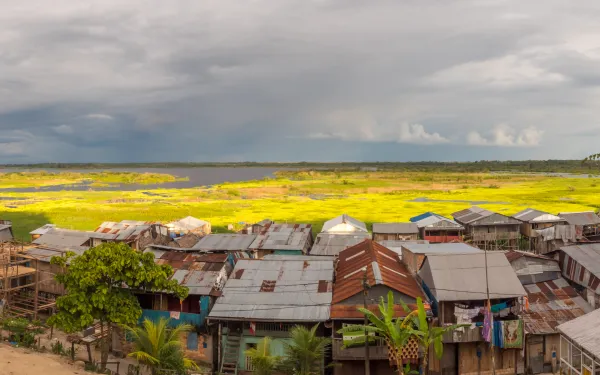
In Peru, a High Court’s Opportunity to Combat Oil Spills in the Amazon
In 2014, 2500 barrels of oil flowing through the Norperuano Pipeline in the heart of the Amazon leaked in the Cuninico River. For native communities, the consequences of the spill persist to this day, affecting the life and integrity of the people of San Francisco, Nueva Esperanza, Cuninico and Santa Rosa, who are still struggling to find clean water to grow their crops. In 2018, accompanied by the Instituto de Defensa Legal, they filed an injunction (known as an amparo in Peruvian courts) in an effort to prevent further spills, calling for the maintenance of the Norperuano Pipeline. Currently, their case is before the Constitutional Court of Peru, which has an unprecedented opportunity to stop oil spills in the Peruvian Amazon and, with them, prevent the systematic violation of the rights of the indigenous peoples who live there. The Court could do both by ruling in the favor of the petitioners and ordering state-owned oil company Petroperu to perform maintenance on the pipeline. AIDA supported the case with an amicus brief detailing the international obligation of the Peruvian state to guarantee the adoption of the necessary measures—administrative, legal, political and cultural—to protect the rights to a dignified life and a healthy environment. A systematic problem with oil infrastructure Sadly, what happened in the Cuninico basin is not a one-time occurrence; it is a systematic problem facing oil infrastructure in the Amazon. Oil spills in the Peruvian Amazon are putting entire families and communities at risk: compromising food security, contaminating ecosystems, and affecting the cosmovision and ways of life of the Amazonian peoples. According to The Shadow of Oil, an OXFAM report from 2020, 65 percent of the 474 spills that occurred in Amazonian oil fields and from the Norperuvian Pipeline between 2000 and 2019—affecting the territory of 41 indigenous communities—were due to pipeline corrosion and operational failures; only 28 percent were caused by third parties. Complementary data from the Organismo de Evaluación y Fiscalización Ambiental and the Organismo Supervisor de la Inversión en Energía y Minería—both public entities—confirm that, for the most part, oil spills derive mainly from a lack of supervision and oversight by the State and the absence of due diligence by the companies. It’s evident that the responsibility for the vast majority of spills lies with the operating companies. This has generated a structural scenario of threats and violations to the human and environmental rights of Peru’s ancestral populations. Broader causes of the continuous oil spills in Peru include a dependence on the extraction of fossil fuels, the lack of maintenance of facilities, institutional weakness, and gaps in corporate responsibility. Strategic litigation: a way forward The courts in the region have been, on many occasions, valuable actors in the protection of the right to a healthy environment and human rights more broadly. In Colombia, courts have prevented the advancement of several projects that were implemented without prior consultation, affecting the rights of indigenous peoples. In Mexico, courts have recognized the rights of indigenous communities to participate in the use and administration of minerals in the subsoil of their territory. In Ecuador, the Constitutional Court (Ecuador's highest court) ordered the Ministry of Environment to remedy the damages caused by palm oil plantations and to take measures to control and mitigate future and potential damages. Now it’s the turn of Peru’s Constitutional Court to defend these rights by moving to protect the Amazon from future oil spills. Undoubtedly, a positive decision would be an important regional precedent for the protection of the Amazon, an indispensable ecosystem. The Amazon region is majestic. Stretching over 2.7 million square miles, it is the largest tropical forest on the planet and is home to at least 10 percent of known biodiversity, much of it endemic. Since ancestral times, it has been home to more than 470 indigenous peoples, quilombolos and traditional communities; among its trees and rivers you can hear more than 86 languages and 650 different dialects. The Amazon is a vital ecosystem in times of climate crisis. It functions as a large carbon sink that stores between 90 and 140 billion metric tons of carbon dioxide, one of the most important greenhouse gases that, if released, would further accelerate climate change. What happened in Peru highlights the importance of strategic litigation to preserve the Amazon as a key ecosystem to confront climate crisis, and to defend the peoples that call it home.
Read more